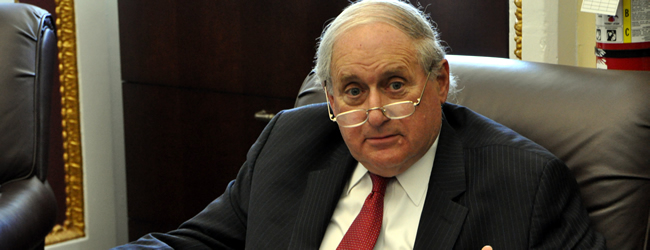National
Levin uncertain about ‘Don’t Ask’ vote count
Senate prepares for critical Tuesday vote


Sen. Carl Levin (D-Mich.), chair of the Senate Armed Services Committee. (Blade photo by Michael Key)
The chair of the Senate Armed Services Committee on Monday expressed uncertainty over whether the Senate would have sufficient votes to move forward with major defense budget legislation containing “Don’t Ask, Don’t Tell” repeal.
During a news conference, Sen. Carl Levin (D-Mich.) said he doesn’t know whether there are 60 votes to end a filibuster and move forward with the fiscal year 2011 defense authorization bill.
The vote for cloture on the legislation, which has language that would lead to the end of “Don’t Ask, Don’t Tell,” is set for Tuesday at 2:15 p.m.
“I hope we can get to cloture,” Levin said. “I know a number of you will ask the question, ‘Do we have the votes?’ My answer is, ‘I don’t know whether we have the votes or not.’ I haven’t done a whip check.”
Levin said he hopes the votes are present to move forward with the defense authorization bill because of “critically important” provisions in the legislation related to military pay and weapons systems.
Provided all 59 Democrats in the Senate vote in favor of cloture, at least one Republican vote is needed to move forward with the defense authorization bill, but GOP leadership is reportedly withholding support for the bill because of a limit imposed on the number of amendments that can be offered on the floor.
Senate Majority Leader Harry Reid (D-Nev.) has said three amendments would be allowed for consideration of the defense authorization bill: an amendment to strip out the “Don’t Ask, Don’t Tell” repeal language; a measure to attach the DREAM Act, an immigration-related bill, to the legislation; and a measure addressing the “secret holds” senators can place on presidential nominees.
Sources have told the Blade that moderate Republicans, including Sen. Susan Collins (R-Maine), are seeking concessions from Democratic leadership in exchange for breaking with the Republican caucus and voting for cloture.
Levin said he’s unaware of any concessions that Collins or other Republicans are seeking over the defense authorization bill. Still, he said he’s spoken with the Maine senator about a previous version of the unanimous consent agreement.
“She and I talked about the consent agreement,” Levin said. “She had some difficulty with it. It wasn’t that she would vote for it if it were changed. That’s not what we talked about. It was she had some difficulty with an earlier draft, and, frankly, I thought she was right.”
Levin said he didn’t ask Collins during this conversation about how the Maine senator intended to vote on the cloture measure on Tuesday.
Asked by the Blade what would happen if cloture isn’t invoked on Tuesday, Levin said an unsuccessful vote would be a “real setback” and said he couldn’t predict what would happen if the bill came up again after Election Day.
“Anyone who tries to predict what will happen in lame duck has got a lot more courage than I do,” Levin said.
A failure to pass the defense authorization bill would almost be unprecedented. A Democratic aide said during the news conference that Congress has passed defense authorization legislation every year for the past 48 years.
If cloture is invoked on Tuesday, opponents of “Don’t Ask, Don’t Tell” repeal would have the opportunity to strip out the repeal language through an amendment on the Senate floor.
Levin said he doesn’t know what opponents of “Don’t Ask, Don’t Tell” repeal are planning when the Senate proceeds tomorrow with the legislation.
“I don’t know what we’re going to see on ‘Don’t Ask, Don’t Tell,'” Levin said. “It’s going to be up to people — if we can get to cloture — who will offer the amendment.”
A Democratic aide said the votes needed to strip the repeal language from the legislation would be either 51 or 60, depending on the agreement reached between majority and minority leadership.
But the main focus of Levin’s news conference was to address arguments from McCain, who has objected to advancing the defense authorization bill on the basis that non-germane amendments are planned for the legislation.
“For many, many years, we never put any extraneous items on the [defense authorization] bill, because it was so important to defense and we just didn’t allow it,” McCain said, according to a Levin statement. “Starting last year, Carl Levin and Harry Reid put hate crimes on it.”
McCain on the floor last week lamented that hate crimes protections legislation was signed into law last year as an amendment to FY 2010 Defense Authorization Act.
During today’s news conference, Levin noted that hate crimes legislation had been attached to defense authorization legislation three additional times prior to 2009, although the measure never made it to the president’s desk before last year.
“Sen. McCain is incorrect on at least two accounts in the one statement,” Levin said. “Last year was not the first time that hate crimes legislation was added to the defense authorization bill … and it was approved by an overwhelming bi-partisan majority each of those three previous times.”
Levin also said other non-germane amendments had been considered as part of the defense authorization bill, including measures on concealed weapons, indecency standards as well as a previous amendment on “secret holds.”
An amendment for campaign finance reform that McCain sponsored in 2000 was also considered as part of the defense authorization bill, according to Levin.
“If we want to give these men and women in the military confidence in their government, we should have fully disclosed who it is that contributes to the political campaigns,” McCain said in 2000, according to a Levin statement.
Levin said he defended McCain’s right to offer this amendment in 2000 as he plans to defend the right of anyone who introduces the DREAM Act this year.
“People have a right to use the rules here and to suggest anything to the contrary is just simply inaccurate and I think has no place in the debate,” Levin said.
McCain’s office didn’t immediately respond to the Blade’s request for comment on Levin’s remarks.
Also during the presser, Levin disputed an account that the DREAM Act would be attached to the defense authorization bill as part of a manager’s amendment that would be inclusive of defense-related items.
A Republican source had earlier told the Blade that Democratic leadership was planning consideration of the DREAM Act and a manager’s amendment as one measure.
“That’s news to me,” Levin said. “I would love to know where you heard it. I’d like to check your source.”
Still, Levin said he expects the DREAM Act to be the first amendment offered to the defense authorization bill on Tuesday following a successful cloture vote.
Federal Government
UPenn erases Lia Thomas’s records as part of settlement with White House
University agreed to ban trans women from women’s sports teams

In a settlement with the Trump-Vance administration announced on Tuesday, the University of Pennsylvania will ban transgender athletes from competing and erase swimming records set by transgender former student Lia Thomas.
The U.S. Department of Education’s Office for Civil Rights found the university in violation of Title IX, the federal rights law barring sex based discrimination in educational institutions, by “permitting males to compete in women’s intercollegiate athletics and to occupy women-only intimate facilities.”
The statement issued by University of Pennsylvania President J. Larry Jameson highlighted how the law’s interpretation was changed substantially under President Donald Trump’s second term.
“The Department of Education OCR investigated the participation of one transgender athlete on the women’s swimming team three years ago, during the 2021-2022 swim season,” he wrote. “At that time, Penn was in compliance with NCAA eligibility rules and Title IX as then interpreted.”
Jameson continued, “Penn has always followed — and continues to follow — Title IX and the applicable policy of the NCAA regarding transgender athletes. NCAA eligibility rules changed in February 2025 with Executive Orders 14168 and 14201 and Penn will continue to adhere to these new rules.”
Writing that “we acknowledge that some student-athletes were disadvantaged by these rules” in place while Thomas was allowed to compete, the university president added, “We recognize this and will apologize to those who experienced a competitive disadvantage or experienced anxiety because of the policies in effect at the time.”
“Today’s resolution agreement with UPenn is yet another example of the Trump effect in action,” Education Secretary Linda McMahon said in a statement. “Thanks to the leadership of President Trump, UPenn has agreed both to apologize for its past Title IX violations and to ensure that women’s sports are protected at the university for future generations of female athletes.”
Under former President Joe Biden, the department’s Office of Civil Rights sought to protect against anti-LGBTQ discrimination in education, bringing investigations and enforcement actions in cases where school officials might, for example, require trans students to use restrooms and facilities consistent with their birth sex or fail to respond to peer harassment over their gender identity.
Much of the legal reasoning behind the Biden-Harris administration’s positions extended from the 2020 U.S. Supreme Court case Bostock v. Clayton County, which found that sex-based discrimination includes that which is based on sexual orientation or gender identity under Title VII rules covering employment practices.
The Trump-Vance administration last week put the state of California on notice that its trans athlete policies were, or once were, in violation of Title IX, which comes amid the ongoing battle with Maine over the same issue.
New York
Two teens shot steps from Stonewall Inn after NYC Pride parade
One of the victims remains in critical condition

On Sunday night, following the annual NYC Pride March, two girls were shot in Sheridan Square, feet away from the historic Stonewall Inn.
According to an NYPD report, the two girls, aged 16 and 17, were shot around 10:15 p.m. as Pride festivities began to wind down. The 16-year-old was struck in the head and, according to police sources, is said to be in critical condition, while the 17-year-old was said to be in stable condition.
The Washington Blade confirmed with the NYPD the details from the police reports and learned no arrests had been made as of noon Monday.
The shooting took place in the Greenwich Village neighborhood of Manhattan, mere feet away from the most famous gay bar in the city — if not the world — the Stonewall Inn. Earlier that day, hundreds of thousands of people marched down Christopher Street to celebrate 55 years of LGBTQ people standing up for their rights.
In June 1969, after police raided the Stonewall Inn, members of the LGBTQ community pushed back, sparking what became known as the Stonewall riots. Over the course of two days, LGBTQ New Yorkers protested the discriminatory policing of queer spaces across the city and mobilized to speak out — and throw bottles if need be — at officers attempting to suppress their existence.
The following year, LGBTQ people returned to the Stonewall Inn and marched through the same streets where queer New Yorkers had been arrested, marking the first “Gay Pride March” in history and declaring that LGBTQ people were not going anywhere.
New York State Assemblywoman Deborah Glick, whose district includes Greenwich Village, took to social media to comment on the shooting.
“After decades of peaceful Pride celebrations — this year gun fire and two people shot near the Stonewall Inn is a reminder that gun violence is everywhere,” the lesbian lawmaker said on X. “Guns are a problem despite the NRA BS.”
New York
Zohran Mamdani participates in NYC Pride parade
Mayoral candidate has detailed LGBTQ rights platform

Zohran Mamdani, the candidate for mayor of New York City who pulled a surprise victory in the primary contest last week, walked in the city’s Pride parade on Sunday.
The Democratic Socialist and New York State Assembly member published photos on social media with New York Attorney General Letitia James, telling followers it was “a joy to march in NYC Pride with the people’s champ” and to “see so many friends on this gorgeous day.”
“Happy Pride NYC,” he wrote, adding a rainbow emoji.
Mamdani’s platform includes a detailed plan for LGBTQ people who “across the United States are facing an increasingly hostile political environment.”
His campaign website explains: “New York City must be a refuge for LGBTQIA+ people, but private institutions in our own city have already started capitulating to Trump’s assault on trans rights.
“Meanwhile, the cost of living crisis confronting working class people across the city hits the LGBTQIA+ community particularly hard, with higher rates of unemployment and homelessness than the rest of the city.”
“The Mamdani administration will protect LGBTQIA+ New Yorkers by expanding and protecting gender-affirming care citywide, making NYC an LGBTQIA+ sanctuary city, and creating the Office of LGBTQIA+ Affairs.”
-

 U.S. Supreme Court5 days ago
U.S. Supreme Court5 days agoSupreme Court upholds ACA rule that makes PrEP, other preventative care free
-

 U.S. Supreme Court5 days ago
U.S. Supreme Court5 days agoSupreme Court rules parents must have option to opt children out of LGBTQ-specific lessons
-

 Television5 days ago
Television5 days ago‘White Lotus,’ ‘Severance,’ ‘Andor’ lead Dorian TV Awards noms
-

 Music & Concerts5 days ago
Music & Concerts5 days agoBerkshire Choral to commemorate Matthew Shepard’s life












